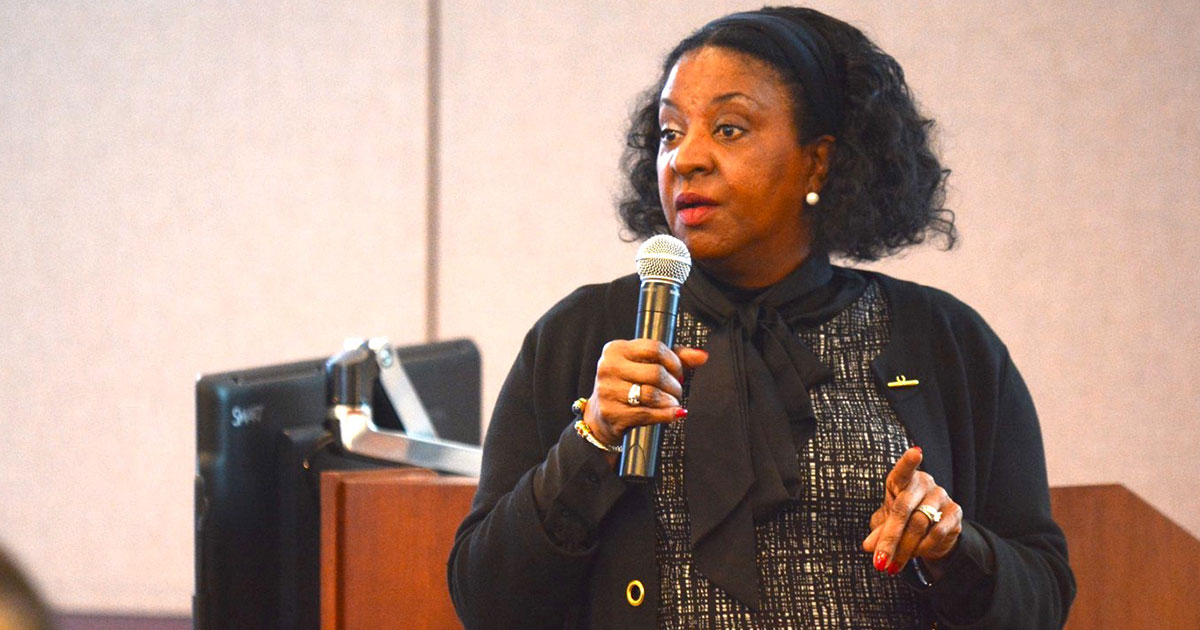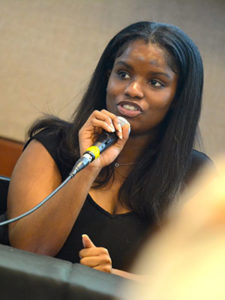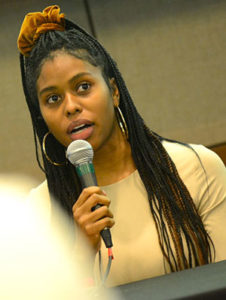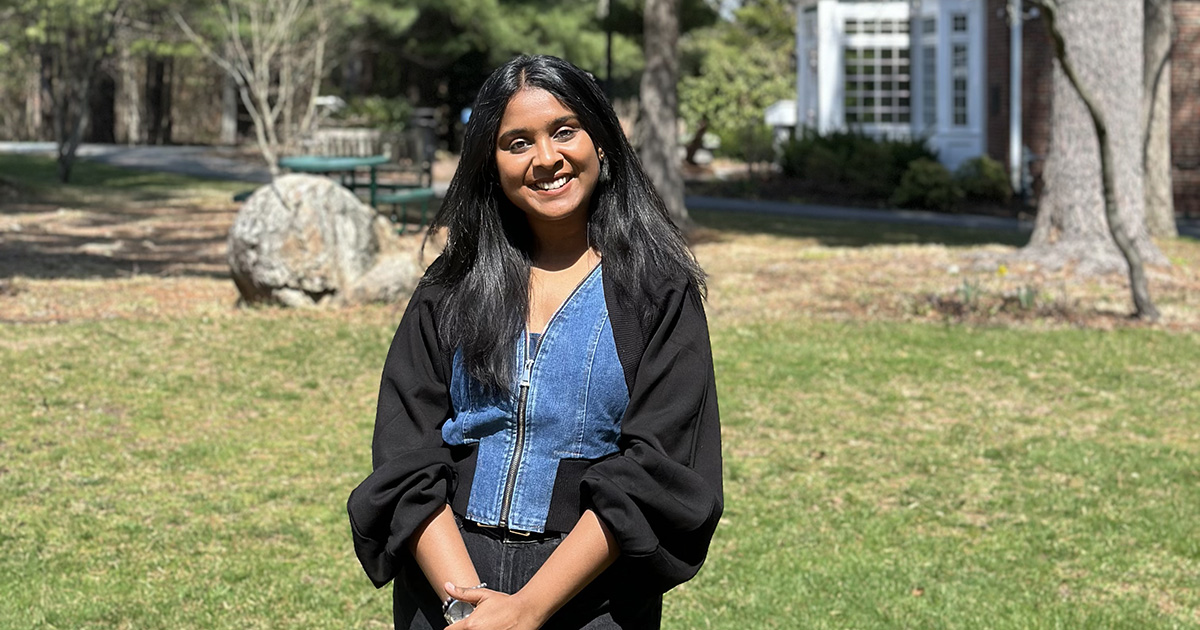Why Diversity, Equity, and Inclusion Matters at Babson College

As student leaders on the Babson College campus, Haja Ba ’24 and Ashley Patterson MBA’22 see firsthand the impact of the College’s commitment to diversity, equity, and inclusion (DEI). Not only are they helping drive DEI on campus, but they also appreciate the efforts across the entire College community.

Haja Ba ’24 of the Black Student Union and The Johnson House
Ba is part of The Johnson House, the College’s special-interest living community for the Black Student Union, for which she serves on the executive board as the director of logistics. She is impressed by how holistic Babson’s DEI initiatives are, and how the entire College community feels so focused on the same goals.
“One of the things that Babson is doing right now is we’re connecting the different organizations and efforts,” Ba said. “The DEI efforts are not isolated; they’re all connected right now. And, we’re trying to find more ways to connect with each other.”
Patterson, the co-president of the Babson Black Graduate Club with Alexander Oubré MBA’22, says those efforts make a difference especially on an individual level.
“To know that I’m a part of a community that cares about what’s happening with you individually and that they’re going to make changes to ensure that your student experience is the best one possible, that’s invaluable to me,” Patterson said. “And, it helps to lift up my own voice and for me to feel empowered and powerful to share my own stories. It’s amazing work that the College is doing.”
Both Ba and Patterson participated in showcasing that work Monday at a community forum about the College’s advancement of its DEI strategy. The community forum, attended by more than 500 people in person and online, marked the culmination of Babson’s celebration of Black History Month.
Black History Month
As Black History Month concludes, the community forum—led by Sadie Burton-Goss, Chief Inclusive Excellence Officer at Babson—was an opportunity for the College to pause and reflect on the work that has been done and the work that remains.
The signature event of Black History Month at Babson was Martin Luther King Jr. Legacy Day, which featured former professional tennis player James Blake’s powerful personal story and call to action. The Johnson House also hosted several other events, including a Black Movie Night, a takeover at Trim Dining Hall, and Spirit Week with programming each day during the final full week of February.
While Black History Month is concluding, Burton-Goss acknowledged that the work and celebration is not.
“For the Black community, every day is important that we acknowledge and that we celebrate—beyond Black History Month. And, we do that at Babson College,” Burton-Goss said. “We do it with clubs, we do it with courses, we do it with our engagement with our students and with one another.”
Empowering Students
At the community forum, Burton-Goss led a panel of eight speakers, including students, faculty, and staff, detailing the myriad ways that the College continues to advance DEI efforts across campus.
Ba spoke about The Johnson House, which opened in 2020 on the 50th anniversary of the founding of the Black Student Union by Eric Johnson ’72, P’08, who now serves on the College’s Board of Trustees. In addition to the events it held during Black History Month, the Johnson House also convenes TJH Talks, social drives, and other community events.

Ashley Patterson MBA’22, co-president of the Babson Black Graduate Club
“We feel so empowered right now. We feel so connected because of what we’ve been able to do,” Ba said after the forum. “We feel like a community right now.”
Patterson spoke about widening the community in the graduate school as co-president of the Babson Black Graduate Club, which previously was the Black MBA Club before recently rebranding under the leadership of Patterson and Oubre. “Because there are so many graduate programs, not just the MBA club, we wanted to make sure that everyone had a place in that community where they can feel at home.”
The forum also introduced new leadership of the College’s Multicultural and Identity Programs (MIP): Natalie Joseph, director; and Anthony Del Real, assistant director. “We work to support students to feel a sense of inclusivity and belonging across identities, every dimension of identity those that are visible and those that are beyond what we observed physically,” Joseph said.
The driving force behind MIP’s efforts are Justice, Equity, Diversity & Inclusion (JEDI) student leaders. “They also are really critical in developing programming that is relevant to what students are talking about and the issues that are pressing in terms of identity and inclusion,” Joseph said.
Supporting Faculty and Staff
Much of the College’s DEI efforts, of course, manifest in the classroom, where faculty engage students and material in deeper ways after completing the Inclusive Teaching Training Program (ITTP).
ITTP—co-created by Jerome Taillard, associate professor of finance and the Professor George Troughton Term Chair in Finance, and Nan Langowitz, professor of management and faculty director of Babson’s Center for Engaged Learning—now has trained 140 full-time faculty members. “It’s really led faculty to take into account DEI at a deep level, a more holistic level than ever before,” Taillard said.
Angela Randolph, assistant professor of entrepreneurship, also serves on the Dean of College Inclusive Excellence Committee (DoCIE) and spoke about a recent luncheon focused on research related to DEI that attracted more than 40 faculty members. Randolph also is helping to grow the Black Women’s Entrepreneurial Leadership (BWEL) program as its faculty advisor. “The program is designed specifically with Black women in mind,” she said. “So, as we think about programming in terms of DEI, it’s important to think about who we’re targeting, in terms of who’s going to appreciate the program and what they need.”
The panel also included Jerry Epps, Babson’s first director of vendor diversity who is building a supplier diversity program from the ground up, and Michael Bruny MBA’18, who leads the College’s Employee Resource Groups, including the Babson Ebony Network.
Competitive Advantage
Babson’s commitment to DEI not only is a central pillar of the strategic plan, but it also is imperative to developing entrepreneurial leaders, said Babson President Stephen Spinelli Jr. MBA’92, PhD.
“Babson believes that you can’t be an entrepreneurial leader if you aren’t inclusive and if you don’t understand the diversity of the environment,” Spinelli said in his opening remarks. “The integration of diversity, equity, and inclusion throughout our curriculum creates a platform that allows us to teach entrepreneurial leadership, and I think that’s an incredible competitive advantage.”
“The integration of diversity, equity, and inclusion throughout our curriculum creates a platform that allows us to teach entrepreneurial leadership, and I think that’s an incredible competitive advantage.”
President Stephen Spinelli Jr. MBA’92, PhD
That integration also is a competitive advantage for students. For Burton-Goss, seeing all of the College’s efforts come together to impact students and their development is the most heartening.
“My hope for all of our students is that they are uniquely prepared to actually engage and lead in a diverse workforce, whether it’s their own or another company,” Burton-Goss said. “This experience uniquely prepares them to do that effectively wherever they are.”
Posted in Community




